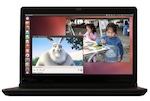Operating systems are like wine: They hopefully increase in quality as they age, and -- unless you're a Beaujolais nouveau fan -- you often don't want to drink one that hasn't yet had at least a little time to mature.


Screen Shot 2012-04-30 at 9.58.31 AM
Operating systems are like wine: They hopefully increase in quality as they age, and — unless you’re a Beaujolais nouveau fan — you often don’t want to drink one that hasn’t yet had at least a little time to mature. But the fact that Ubuntu 12.04 was released only days ago isn’t stopping a number of PC vendors from shipping the new release on their hardware already. Here’s a look at the status of Ubuntu 12.04 and OEMs.There’s nothing wrong with Ubuntu 12.04, which represents the most recent version of one of the world’s most popular Linux distributions. It’s pretty stable, and in my experience so far — which I’ll detail in a future post — it’s a very solid release with a lot of nice features. But like all newly debuted software products, it’s not perfect, and so shipping it preinstalled on PCs at this early date is an ambitious venture.
Who’s Preloading Ubuntu 12.04?
Yet some Linux-friendly PC vendors are already doing just that. Here’s the rundown of the status of Ubuntu 12.04 support among major Linux-friendly OEMs:
System76, the only OEM of which I’m aware that offers Ubuntu exclusively as the OS choice on its desktops, laptops and servers, started shipping Ubuntu 12.04 when it was released on April 26. It is now the only version of the operating system available in the System76 online store — though I suspect that if you wanted an older version of Ubuntu preinstalled and submitted a special request, the company would be happy to oblige. When asked about hardware validation, System76 representative Emma Marshall assured me that all System76 PCs have already been thoroughly tested for the new OS.
ZaReason, which sells computers that can be preloaded with a variety of Linux distributions, has also been offering Ubuntu 12.04 since last week. Some older variants of the *buntu family (though not Ubuntu <12.04 itself) are also available, and customers can request any distribution and version by specifying a preference at purchase time.
ThinkPenguin, another OEM which deals exclusively in Linux, currently offers both Ubuntu 11.10 and Ubuntu 12.04 as OS options on its machines.
Evo Technologies provides Ubuntu 10.04 and 12.04 as OS choices, among other Linux distributions — though they’ll cost you $20 more than if you ordered your machine with no software preinstalled.
eRacks is still preloading only Ubuntu 11.10, alongside a variety of other Linux distributions.
Dell, whose relationship with Ubuntu has been hit-and-miss since the company first began preinstalling the operating system on desktops and laptops in 2007, currently offers only Ubuntu 11.04 on its Linux systems. But at least Ubuntu remains an option from this mainstream PC vendor.
It’s also worth noting that besides those OEMs providing Ubuntu as a preinstalled option on their systems, Lenovo and Dell have also had a selection of their PCs certified for Ubuntu 12.04. Other vendors will no doubt follow in coming months, as the new release gains popularity.
For most Ubuntu enthusiasts, of course, being able to buy a PC with the very latest version of Ubuntu preloaded is probably not nearly as important as simply purchasing a computer without paying the Windows tax. After all, installing Ubuntu and most other Linux distributions is pretty easy these days, and there’s nothing stopping most people from upgrading or downgrading to whichever version of the operating system they like best.
All the same, the embrace of Ubuntu 12.04 by several Linux-centric OEMs reflects the new operating system’s momentum, which will likely only increase as it evolves further and lingering bugs are ironed out.
About the Author(s)
You May Also Like


